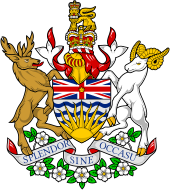| 39th Parliament of British Columbia | |||
|---|---|---|---|
| Majority parliament | |||
| 3 June 2009 – 16 April 2013 | |||
 | |||
| Parliament leaders | |||
| Premier | Gordon Campbell 5 June 2001 – 14 March 2011 | ||
| Christy Clark 14 March 2011 – 18 July 2017 | |||
| Cabinets | Campbell III C. Clark I | ||
| Leader of the Opposition | Carole James 17 May 2005 – 19 January 2011 | ||
| Dawn Black 19 January – 17 April 2011 | |||
| Adrian Dix 17 April 2011 – 4 May 2014 | |||
| Party caucuses | |||
| Government | Liberal Party | ||
| Opposition | New Democratic Party | ||
| Unrecognized | Conservative Party | ||
| Legislative Assembly | |||
| Speaker of the Assembly | Bill Barisoff 12 September 2005 – 14 March 2013 | ||
| Members | 85 MLA seats | ||
| Sovereign | |||
| Monarch | Elizabeth II 6 February 1952 – present | ||
| Lieutenant Governor | Steven Point 1 October 2007 – 2 November 2012 | ||
| Judith Guichon 2 November 2012 – present | |||
| Sessions | |||
| 1st session August 25, 2009 – February 9, 2010 | |||
| 2nd session February 9, 2010 – February 14, 2011 | |||
| 3rd session February 14, 2011 – October 3, 2011 | |||
| 4th session October 3, 2011 – February 12, 2013 | |||
| 5th session February 12, 2013 – March 14, 2013 | |||
| |||
The 39th Parliament of British Columbia sat from 2009 to 2013, replacing the 38th parliament and being succeeded by the 40th parliament. It was composed of two elements: the Legislative Assembly of British Columbia, as elected by the general election of May 12, 2009, and The Queen represented by the Lieutenant-Governor (Steven Point until 2012, then Judith Guichon). That election resulted in a majority government for the BC Liberal Party led by Gordon Campbell, and a BC New Democratic Party official opposition.
Shortly after the election, the government revealed it had been running record high deficits and that it intended to replace the PST and GST system with the Harmonized Sales Tax. The deficit made an amendment to the Balanced Budget and Ministerial Accountability Act necessary for the remainder of the 39th Parliament and resulted in reduced spending in most ministries. A petition against the Harmonized Sales Tax was circulated around the province and resulted in a summer 2011 referendum on the issue.
The unpopularity of the move towards HST led to the resignation of Premier Campbell. The ensuing leadership election was won by Christy Clark, who was subsequently sworn in as the new Premier on March 14, 2011. Separately and independently, the New Democrats also held a leadership election, and Adrian Dix became the new Leader of the Opposition.
Seven MLAs spent time as independents: Vicki Huntington was elected as an independent, Blair Lekstrom left the BC Liberals in protest of its implementation of the HST, Pat Pimm briefly left the BC Liberals during as he was being investigated for a domestic dispute incident, John Slater withdrew from the BC Liberal Party after they refused to endorse his re-election nomination in 2013, John van Dongen crossed the floor to the BC Conservatives before leaving that party to sit as an independent, and both BC Liberal Bill Bennett and NDP Bob Simpson were removed from their caucuses for criticizing their leaders. Three MLAs were subject of police investigations: Kash Heed for election irregularities, Jane Thornthwaite for drunk driving, and Pat Pimm for a domestic dispute. Two MLAs, both from the BC Liberals, resigned their seats forcing by-elections: Iain Black in Port Moody-Coquitlam and Barry Penner in Chilliwack-Hope.
In addition to the Consumption Tax Rebate and Transition Act which implemented the HST, major new legislation adopted during the 39th Parliament included the Clean Energy Act, which listed and enabled provincial objectives regarding electricity generation and consumption. The Ambulance Services Collective Agreement Act forced the workers at the BC Ambulance Service back to work after a seven-month strike. The Sled Dog Task Force and the Braidwood Inquiry led to legislative amendments, the New West Partnership (Trade, Investment and Labour Mobility Agreement) had enabling legislation enacted, and inheritance laws were modernized. The Skaha Bluffs Provincial Park was created, as well as six new parks in the Lillooet region